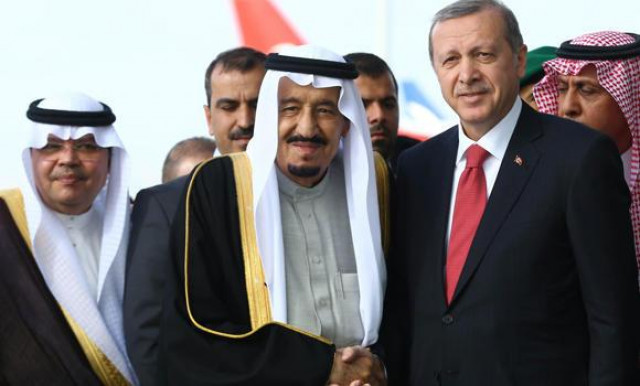Turkey seeks to heal Muslim wounds at Istanbul summit
Turkey's hosting of the OIC summit on is a new symbol of its desire to be seen as a major power in the Islamic world

PHOTO: AFP
Turkey's hosting of the Organisation of Islamic Cooperation (OIC) summit on Thursday and Friday is a new symbol of its desire to be seen as a major power in the Islamic world, especially in lands once controlled by the Ottoman Empire.
Muslim body to focus on Palestinians, terror at Turkey summit
But the policies of Turkey's Islamic-rooted government have at times been divisive, in particular over five-year civil war in Syria where it has been accused of aiding fundamentalist rebels in the hope they will oust Syrian President Bashar al-Assad.
Hit by a crisis in relations with Egypt's secular rulers and at times tricky ties with Shiite Iran, Turkey has sought to build alliances with fellow overwhelmingly Sunni Muslim powers Saudi Arabia and Qatar.
Turkey's ambitious foreign policy aim of "zero problems with neighbours" unravelled as crises erupted on almost all of its borders and the summit is a chance for Erdogan to show its ability to solve rather than create crises.
"Hosting the OIC summit is prestigious and an opportunity for Turkey. It comes at a very good moment when Turkey needs to restore its image in the Muslim world," Jean Marcou, political scientist and research director at Sciences Po Grenoble in France told AFP.
There is a security lockdown around the summit venue in Istanbul, the former capital of the Ottoman Empire from where the Sultans once ruled Muslims from the Balkans to Arabia.
The opulent arrangements of the most significant guest -- Saudi King Salman -- have also raised eyebrows in the Turkish press with reports saying some 500 luxury cars were hired for his delegation.
US Embassy warns citizens about 'credible threats' in Turkey
Muslim countries have failed to find a common position over the conflict in Syria, where Turkey and Saudi back rebels fighting Assad and Iran is a strong supporter of the regime.
Turkish Foreign Minister Mevlut Cavusoglu said the summit was being held at a time when "the Islamic world is experiencing many disputes within itself."
"Fratricidal conflict cause great pain. Sectarianism divides the ummah," he told OIC foreign ministers on Tuesday, using the Arabic world for the Muslim community.
"Hopefully, this summit will pave the way for healing some wounds."
The summit takes place in the wake of a bilateral meeting in Ankara on Tuesday between Erdogan and King Salman which underlined the importance ties with Riyadh now have in Turkey's foreign policy.
Erdogan went to Ankara's Esenboga airport to personally welcome the Saudi monarch on the tarmac and then gave him Turkey's highest honour for a foreign leader.
Soner Cagaptay, director of the Turkish Research Program at The Washington Institute, said Turkey's close alignment with Saudi Arabia was now a "fact of life" but warned Ankara should take care as to how this is perceived in the Muslim world.
"There is a risk that this close alignment with the Saudis could cast Turkey in the eyes of people in the Middle East as a more sectarian nation than it ought to be," he told AFP.
Turkey strikes Islamic State in Syria after rockets hit border town: official
"I think it's a delicate balance for Turkey."
The summit is taking place amid an apparent recalibration in Turkish foreign policy owing to the crisis in ties with Russia after the shooting down of a Russian warplane by Ankara and increasingly tense relations with the US and EU.
Turkey is working to normalise ties with Israel after a crisis lasting over half a decade while there have been suggestions Saudi Arabia is working hard behind the scenes to bring about a similar reconciliation with Egypt.
Erdogan was enraged by the 2013 ousting of Egyptian president Mohammed Morsi, a close Ankara ally, and has denounced President Abdel Fattah al-Sisi as an "illegitimate tyrant".
Sisi is expected to be one of several notable absentees from the summit, as well as Jordan's King Abdullah amid tensions over Syria.
"If the Saudi King can deliver Turkish-Egyptian normalisation then that's huge," said Cagaptay.
But he added: "Turkish-Egyptian normalisation is less likely today than Turkey-Israeli normalisation as it is driven by deep animosity between the leaders."



















COMMENTS
Comments are moderated and generally will be posted if they are on-topic and not abusive.
For more information, please see our Comments FAQ